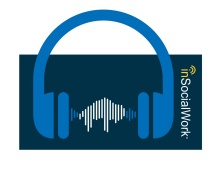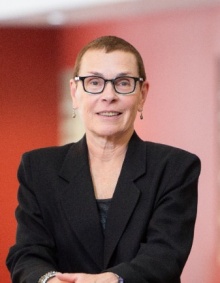Highlights
ON THE PODCAST
School social work: perception and reality

“Don’t be afraid to have a voice. Advocate for yourself. If you have ideas, get involved. Eventually, people will hear you and understand.” — Stephanie Stodolka, LMSW, director of social-emotional learning at Buffalo Academy of Science Charter School
On a recent episode of inSocialWork®, Stodolka joined Alyssa Ernst, MSW ’10, LMSW, a school social worker in the Cheektowaga-Sloan Union Free School District, to discuss common misperceptions of school social work — and give an informed heads-up to anyone considering a career in this area.
GOOD NEWS
A pioneering professor

The National Association of Social Workers (NASW) has named Diane E. Elze, associate professor emeritus, an NASW Social Work Pioneer, one of the profession’s highest honors. Elze was inducted this fall in recognition of her enduring impact on LGBTQ+ youth.
Among other pioneering contributions, Elze co-founded several queer advocacy and support organizations in Maine — where she began her career — including Outright Portland, the state’s first queer youth support and advocacy group. As a founding board member of the Maine Lesbian/Gay
Political Alliance (now Equality Maine), Elze helped establish the state’s oldest and largest LGBTQ+ political advocacy organization.
After shifting into academia, Elze focused her research on LGBTQ+ youth and human rights, among other topics. In 2005, she joined UB, inspiring a generation of students and helping to propel the School of Social Work forward. She retired last year after 17 years of dedicated service.
RESEARCH SPOTLIGHT
Unlocking resources to support recovery

A multidisciplinary team led by Elizabeth Bowen, associate professor of social work, has developed and tested a new assessment tool that can potentially help people recover from alcohol and drug addiction.
The Multidimensional Inventory of Recovery Capital (MIRC) is a reliable measure of recovery capital or the resources that support or hinder an individual’s successful recovery. Published in the journal Drug and Alcohol Dependence, the project was funded by a $408,000 grant from the National Institute on Alcohol Abuse and Alcoholism.
“It’s important to measure recovery capital so we can understand the inequities that influence recovery,” says Bowen. “Ultimately, I’m interested in doing something to address those disparities, and the MIRC can provide the required momentum.”
Individuals can use the MIRC to self-assess their own recovery capital, while clinicians and social workers can use it to better support their clients. The MIRC is also being used by researchers and integrated into larger systems, including the HealthCall care delivery platform.